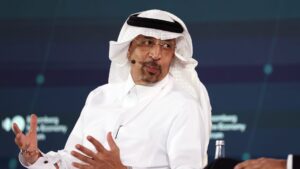Khalid Al-Falih, Saudi Arabia’s investment minister, during the Bloomberg New Economy Forum in Singapore, on Wednesday, Nov. 8, 2023.
Bloomberg | Bloomberg | Getty Images
Saudi Minister of Investment Khalid al-Falih recently addressed skepticism surrounding Saudi Arabia’s economic diversification plan. Riyadh is actively promoting “green shoring” investment opportunities to attract foreign financing.
“There were many people who doubted the vision and ambition of Vision 2030, questioning if a country like Saudi Arabia, historically dependent on oil revenues, could achieve what we aspire to do,” al-Falih told CNBC’s Steve Sedgwick at the Ambrosetti Forum in Cernobbio, Italy.
Saudi Arabia, one of the biggest economies in the Middle East and a crucial U.S. ally, has been investing heavily to realize Crown Prince Mohammed bin Salman’s Vision 2030 economic diversification plan. This initiative includes 14 giga-projects, including the Neom industrial complex.
With Vision 2030, Riyadh aims to move away from its reliance on oil revenues and enhance the domestic economy with financial flows exceeding $3 trillion, while attracting $100 billion in foreign domestic investment annually by 2030.
Al-Falih mentioned that after eight years of pursuing Vision 2030, Saudi Arabia has made significant progress, with 87% of its targets already implemented or nearing completion. Critics have raised concerns about the kingdom’s ability to meet its goals by the designated deadline.
In recent years, Saudi Arabia has been working on liberalizing its market and improving the business environment through reforms in investment and labor laws. However, some unpopular requirements include companies needing to establish regional headquarters in Saudi Arabia to access government contracts.
The IMF noted a substantial increase in foreign investment licenses issued in Saudi Arabia in 2023, with a 5.6% annual rise in net flows of foreign direct investment in the first quarter.
While concerns persist regarding the legal framework and dispute resolution system for foreign investment in Saudi Arabia, al-Falih emphasized the country’s predictability, political stability, and economic stability.

‘Green shoring’
Al-Falih highlighted Riyadh’s emphasis on “green shoring,” a Saudi initiative aimed at decarbonizing supply chains in regions abundant in renewable energy resources.
“Green shoring involves focusing high-energy processing and manufacturing value-add in areas rich in materials and energy,” explained al-Falih, emphasizing Saudi Arabia’s logistical, capital, and infrastructural capabilities in this regard.
As part of its commitment to Vision 2030, the world’s largest oil exporter is targeting net-zero emissions by 2060. Alongside the UAE, Riyadh has been actively participating in climate summits, although questions remain about its decarbonization commitment.
Riyadh, like other OPEC members, advocates for the simultaneous use of hydrocarbons and green resources to prevent global energy shortages during the transition to net-zero emissions.
However, some environmental activists criticize Saudi Arabia’s promotion of carbon capture and storage (CCS) technologies as a tactic to continue its lucrative oil business.
Through “green shoring,” Saudi Arabia aims to enhance global supply chain resilience and contribute to a more sustainable global economy by addressing critical material shortages and promoting green technologies.
In the evolving landscape of international investments, Saudi Arabia’s economic diversification plan, Vision 2030, has been a topic of significant interest. As a key player in the Middle East and a strategic ally to the United States, Riyadh’s efforts to transition away from its reliance on oil revenues have garnered global attention.
At Extreme Investor Network, we recognize the importance of understanding the intricacies of Saudi Arabia’s economic transformation and the potential investment opportunities it presents. With our expertise in navigating complex financial landscapes, we aim to provide valuable insights into the country’s economic diversification journey.
Saudi Minister of Investment Khalid al-Falih’s recent remarks on Riyadh’s “green shoring” initiative highlight the kingdom’s commitment to sustainability and renewable energy. By emphasizing the importance of decarbonizing supply chains and leveraging renewable resources, Saudi Arabia aims to position itself as a leader in the global transition to a more sustainable economy.
With a focus on attracting foreign investments and fostering a business-friendly environment, Saudi Arabia has been making significant strides in implementing Vision 2030. Through strategic reforms and targeted investments in key sectors, the kingdom is paving the way for a more diversified and resilient economy.
As investors look for new opportunities in emerging markets, Saudi Arabia’s ambitious diversification plan offers a unique prospect for growth and innovation. By staying informed about the latest developments in the kingdom’s economic landscape, investors can position themselves to capitalize on the potential benefits of Riyadh’s vision for the future.
At Extreme Investor Network, we are dedicated to providing our readers with in-depth analysis and expert insights into the latest trends and opportunities in the global economy. Stay tuned for more updates on Saudi Arabia’s economic transformation and other key developments shaping the world of investments.

